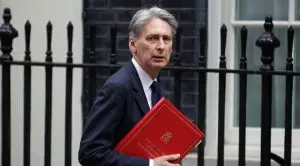 Chancellor of the Exchequer, Philip Hammond, has confessed that the put off the implementation of the fixed-odds betting terminals (FOBTs) crackdown after lobbying from the industry.
Chancellor of the Exchequer, Philip Hammond, has confessed that the put off the implementation of the fixed-odds betting terminals (FOBTs) crackdown after lobbying from the industry.
Chancellor Hammond explained that he initially intended to roll out the changes in the gaming duty in April 2019 in order to compensate for the revenue expected to be lost as a result of the reduction of the FOBT maximum stake from £100 to £2. However, gambling operators claimed that the changes could have a devastating impact on their businesses, as about 21,000 jobs could be lost due to the crackdown. As revealed by Chancellor Hammond, it was these claims which made the Treasury decide to roll out the changes next October.
Philip Hammond denies abandoning goal of eliminating UK deficit pic.twitter.com/AlvPXxHOVY
— nreal ™ (@Nawe_9ja) November 5, 2018
Since the announcement about the expected crackdown implementation, Chancellor of the Exchequer faced extreme criticism that he had put gambling businesses’ interests over gambling addicts’ lives and well-being. This was the first time Mr. Hammond defended himself since the resignation of Tracey Crouch from the role of Minister of Sports and Civil Society last week.
Chancellor Hammond has a reputation for budget fiascoes but he has surpassed himself this time. It is virtually unprecedented to have a minister resign during a budget but Philip Hammond has pulled it off. https://t.co/mZXywmXRd1
— John McDonnell MP (@johnmcdonnellMP) November 1, 2018
Ms. Crouch has chosen to quit her ministerial role, as she was disappointed with the decision of the UK Government to delay the implementation of the new FOBT rules in October 2019 rather than in April 2019 instead. She has been one of the most eager opponents of the machines and their devastating impact on problem gamblers’ physical, mental and emotional health.
Sensible Decision Was Necessary, Says Chancellor Hammond
 Mr. Hammond defended himself, saying that he had “absolutely no love” for the controversial fixed-odds betting machines and thought they were “terrible things”. He, however, noted that the UK Government had to manage the issue in a sensible way, so it needed to find out a measure which will have a significant impact on the gambling industry.
Mr. Hammond defended himself, saying that he had “absolutely no love” for the controversial fixed-odds betting machines and thought they were “terrible things”. He, however, noted that the UK Government had to manage the issue in a sensible way, so it needed to find out a measure which will have a significant impact on the gambling industry.
As The Times reported, Mr. Hammond further explained that the reduction of the maximum stake allowed at FOBTs would some day lead to their disappearance. The reason is simple – the machines would no longer be profitable enough for gambling businesses, so the latter would eliminate them themselves. According to the sector’s own estimates, between 15,000 and 21,000 jobs would be lost following the elimination of FOBTs. This, on the other hand, is expected to lead to high-street betting shops closures.
Today I presented my Budget to Parliament. It shows the hard work of the British people is paying off: our careful fiscal management and solid economic recovery means that austerity is coming to an end. Read my full speech here: https://t.co/Klsovq2pgA #Budget2018
— Philip Hammond (@PhilipHammondUK) October 29, 2018
As explained by Chancellor Hammond to the Treasury Committee, the negative consequences for the local gambling industry would not be eliminated through the delay, but by giving such businesses a “sensible period of time” to adapt to the changes and make sure that as many as the expected job losses are dealt through “voluntary redundancy processes”.
The Chancellor of Exchequer said that the timing of the changes was not chosen in correspondence to the Treasury’s wish to keep its gambling tax revenue flow, explaining that a simultaneous increase in the tax owed by the online gambling operators is planned to compensate for the losses.
- Author


